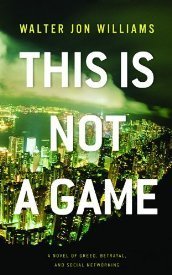This Is Not a Game (a book by Walter Jon Williams)
by Fran Ilich <fran@eyebeam.org>
This novel tells the plot that takes over the life of an alternate reality game producer who is in Southeast Asia, taking a break from work just weeks after finishing the biggest project so-far in her career. She is one of the lucky few to be able to make more than decent money on such nascent genre of narrative gaming as the ARG, and she is grateful for having landed such job in a company founded by 3 of her gaming buddies from back in college. However, what she experiences in Djakarta is something she never expected (her life gets tangled in what it seems, but isn’t an ARG): a currency collapse that devalues the Indonesian Rupiah and makes the prices on everything skyrocket. She is used to a strict diet of the latest in digital payments, the lowest-tech one being the credit card, and so, she is left out of the economic flow and has to survive with only a couple of rupiahs and maybe $200 USD in cash. Not enough to survive when trapped in a 5 star hotel. And so, while waiting to be extracted (rescued) by an operation contracted and planned by the company where she develops alternate reality games the fabric between reality and fiction starts to blur. Of course her company is used to stage situations like these, but even though they happen in the real world they are always part of actions that will only leave a mark on the world of players. But now all of this is being filtered into global media, and she finds out that the followers of Great Big Idea can respond to real life situations from the comfort of their mediated reality, as for them there is barely a distinction among both. And so while these follow the events, they have to remind to themselves every now and then: “This is not a game.”
While she awaits to be rescued, her boss and friend comissions her to design an even bigger alternate reality game to promote his latest investment: a mmorpg. And so she gets inspiration from the chaos where she’s inmersed, as Djakarta seems to fall down to ashes. And when she finally gets back to Los Angeles, she has to face and struggle the grim realities of marketing. Her boss wants to use the game to push several gadgets where he is a main investor in order to not lose money: a water-tester and decryption software. She on the other hand worries about losing street-cred and integrity as a designer. However this is the reality of the trade if the Alternate Reality Games genre want to raise to an industrial art level. And so, she has to experiment with creative accounting techniques to trick the corporation where she works, while at the same time all of them are being puppet-mastered (including she, the puppet-master) to allow some bots to continue with their financial speculation.
And so, the book could end up being just another entertaining and resourceful cyberpunk novel about the media of the day after tomorrow, but because of the remarkable description and emphasis it makes on the genre and profession of alternate reality games, and the lives of everyone involved: designers, producers, venture capitalists; describing the complexities of what a production unit would need for such an industry to bloom; showing all sort of intricacies with venture capitalism, mafias, information and technology industries, as well as unimaginable forms of feedback involving the subscriber base. When a game intertwines with real crime, economical, political and social situations, where do you draw the line between reality and fiction? And how? Isn’t this exactly the way in which historically the powers that be create narratives and ideologies to manufacture consent and furthermore, to materialize such consensual hallucination known as Absolute Reality?
This is not a game is recommended to anone who wants to either understand or run alternate reality games. The novel was written by Walter Jon Williams, an experienced player and designer of role playing games, specifically for Cyberpunk 2020 (Hardwired), and such thing comes very handy as the insights it provides not only include aerial view and first person shots, but it finds a special spot on the noble tradition of writers books on writing, one that could open the imagination of millions to new possibilities across narrative-media and games, much beyond the conventions of Hollywood films and videogame industries, but still in the much disputed battlefield where change in capital letters seems to occur: the mainstream. And this is not a minor thing, it brings hope and new blood while managing to design an alternate reality game which only exists in literature and written words.




